Why is it so hard to hire and keep cops in Seattle?

If you listen to many elected officials in Seattle right now, the No. 1 issue at the Seattle Police Department is hiring.
And the numbers seem to bear that out. Since 2020, Seattle has lost 612 officers, and hired 257. The total net loss in that four-year period is 355 officers.
While departures have slowed down from their height in 2020, Mayor Bruce Harrell’s introduction of a “comprehensive” recruitment plan that includes big bonuses for new hires has so far failed to reverse the trend of a shrinking department.
2019 was the last year SPD added more officers than it lost due to retirements, taking a job at another department, or leaving the profession entirely.
In 2023, Seattle had the lowest police staffing levels in the city since 1991.
“Staffing is probably the biggest issue that affects the day-to-day reality for SPD officers and the public,” said KUOW reporter Amy Radil in conversation with Soundside host Libby Denkmann.
Radil said the department does face other challenges, including negotiations for a new Seattle Police Officers Guild contract, continued federal oversight, and open cases against police officers, such as the investigations into a police union official who was recorded joking about the death of 23-year-old Jaahnavi Kandula after another SPD officer struck and killed her with his patrol car.
Radil also said the department has changed since 2020, when thousands of Seattleites took to the streets to demand sweeping reforms in policing in the wake of George Floyd’s murder.
At the time, the majority of the Seattle City Council supported a framework put forward by activists to “defund” the police department by 50%. That never happened. The City Council voted to eliminate 80 vacant positions at SPD but also agreed to fund the hiring incentives in the mayor’s plan to recruit 500 officers in five years.
“I tend to think of it as SPD eventually defunded itself,” Radil said. “Its funding was not removed. But it shrank because so many officers left and their positions remained unfilled, even though they were budgeted and planned for by the city and by SPD.”
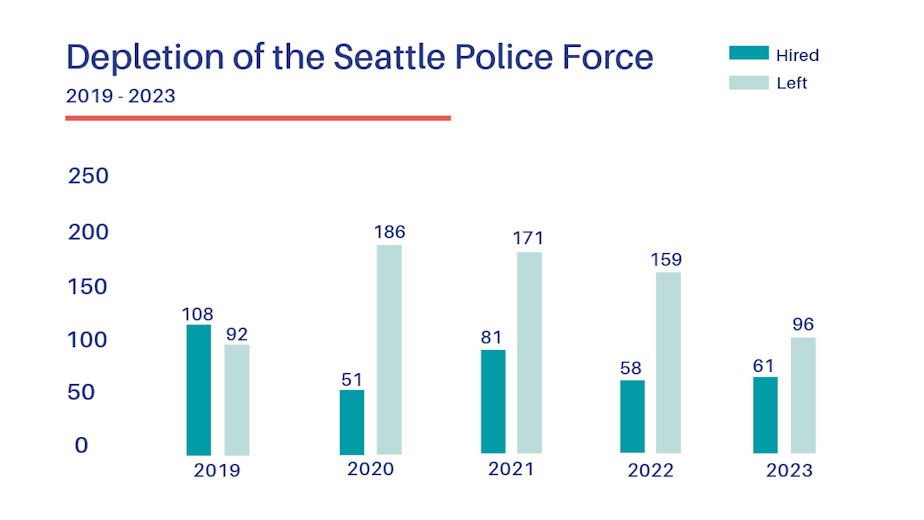
And Seattle is not alone in its struggle with police staffing.
Seattle Police Officers Guild points to politics
In October, a report from the U.S. Department of Justice identified “an historic crisis in recruiting and retaining qualified candidates” facing law enforcement agencies across the country.
The DOJ identified a number of causes for the crisis, including the Covid pandemic and a tightening labor market (aka low unemployment).
According to Seattle Police Officers Guild President Mike Solan, however, it comes down to the real-world impact of messaging from local leaders.
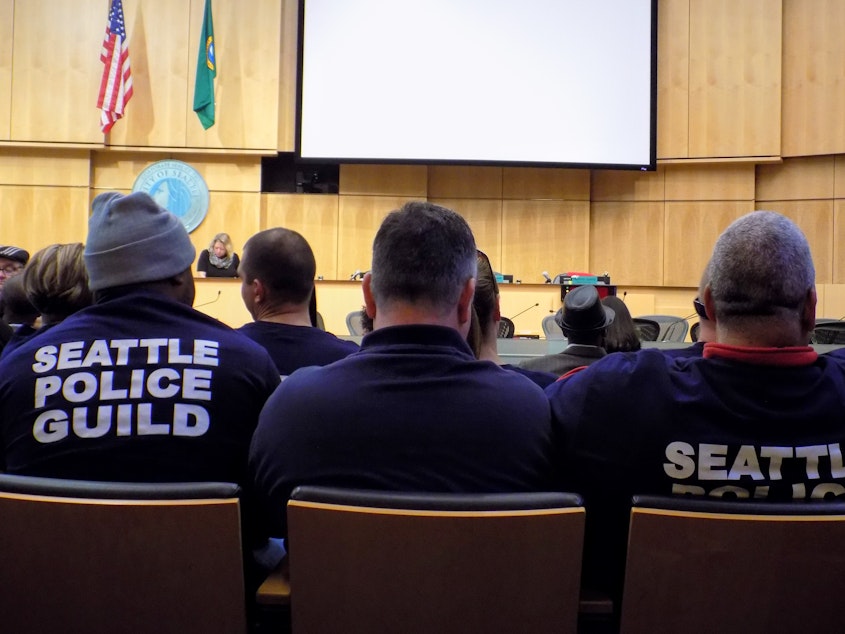
“We, for a very long time, have not had the political support from our elected leaders in this city,” Solan said. Like Radil, Solan pointed to continued labor contract negotiations as another issue that could be impacting recruitment of new officers.
The atmosphere for police has been worsened by Seattle’s progressive politics, according to Solan. He said the rhetoric has undermined recent hiring and retention for the department.
He also said officers fear legal prosecution for doing their jobs.
“We are already the most accountable law enforcement agency in the United States of America,” Solan said, pointing to three groups to which Seattle Police must answer — the Community Police Commission, the Office of Police Accountability, and the Office of Inspector General for Public Safety. “It's to the point where now, there's just so much scrutiny that a lot of the people just cite how unreasonable it is.”
Solan said one example of unreasonable oversight is a 2017 case in Eastlake, where two police officers fired their weapons a total of more than 30 times at a stolen car.
Then-Police Chief Carmen Best fired both officers after an internal investigation found they had violated policies around de-escalation and use of force.
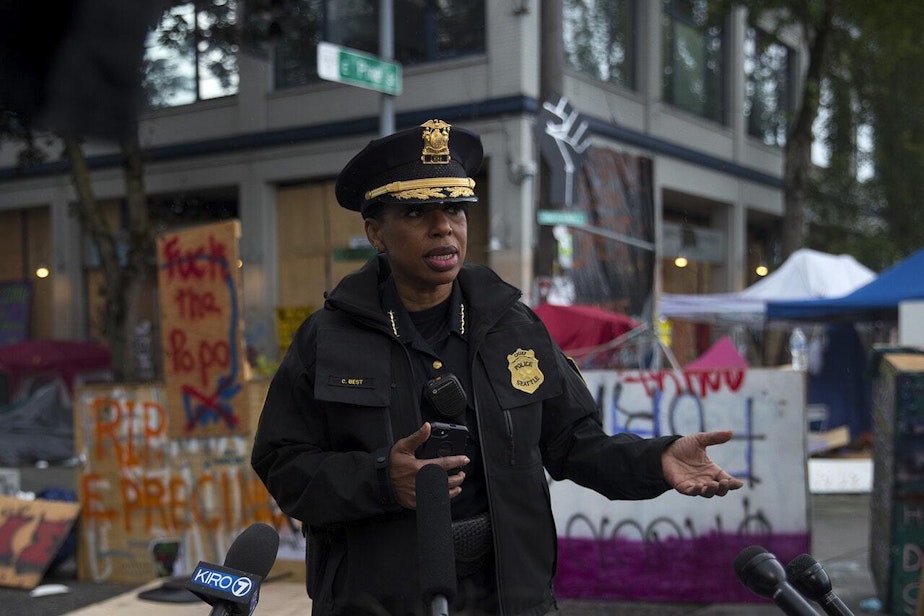
The union appealed, and last month, an outside arbitrator ruled that one of the officers — Tabitha Sexton — was wrongly terminated and was owed back-pay and other compensation totaling more than $600,000.
Mayor Bruce Harrell immediately denounced the arbitrator’s decision and called for an appeal, which the city filed this week. That doesn’t sit well with Solan.
“The disciplinary structure is laid out, agreed to by both parties,” he said. “And yet, when one party, the city, doesn't like a ruling from an independent arbitrator, somebody who is unbiased, and then the city then says publicly, they're going to appeal that decision, it doesn’t give people much confidence that the system in place that both parties have agreed to is being adhered to by both parties.”
But Solan said, on the whole, he has a positive view of Mayor Harrell’s handling of public safety and the police department during his first term in office.
And he’s encouraged by November’s election, when a wave of City Council candidates won seats while promising to improve the council’s relationship with SPD.
RELATED: Will Seattle become a law-and-order town after this election?
Solan also described contract negotiations as “going well,” and said that SPOG has a “sound” and “respectful and professional” relationship with the city’s negotiating team.
A Seattle police officer says the decision is personal
In an email to Soundside staff, Mayor Bruce Harrell’s office said that the city has accelerated its police hiring process so that it takes less time to bring on successful applicants.
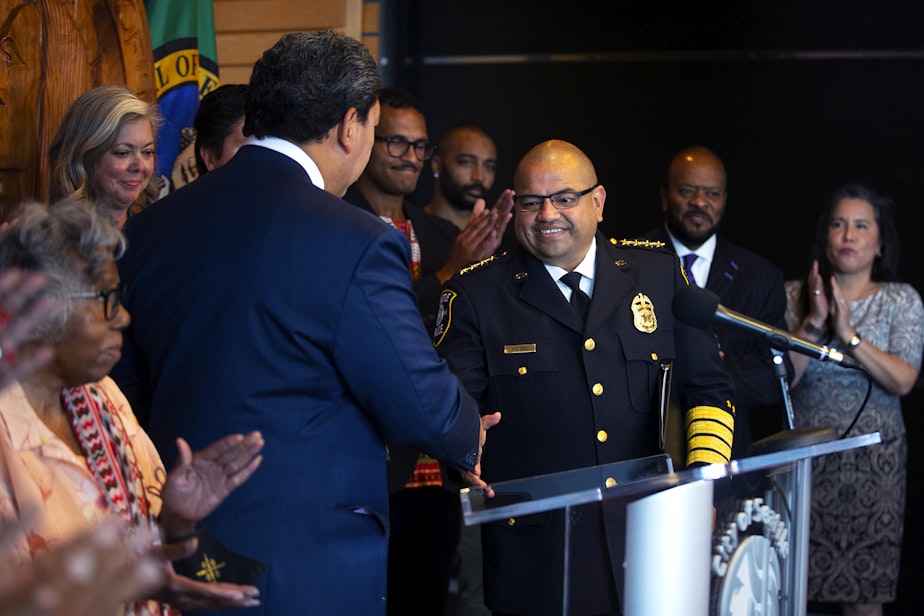
They’ve also created a workshop to make applying easier, and are now offering ride-alongs and additional training opportunities for interested candidates.
And there are the new hiring incentives — $30,000 for lateral transfers and $7,500 for new recruits.
RELATED: Seattle banks on hiring bonuses to draw new police recruits
The mayor’s office said these changes are making a difference. Still, the overall number of officers continued to decline in 2023.
“To be frank with you. I think people just aren't interested in the profession right now,” said SPD officer Brian Pritchard.
“I think that's possibly because they really don't understand what officers do,” he said. “Or they've heard things about being an officer, and they really don't want to kind of go for that career.”
Officer Pritchard works with the media on behalf of the department. He was an evidence technician at the department for 14 years before choosing to become a police officer in his forties.
Pritchard said joining law enforcement is a very personal decision.
Pritchard said his goal when he responds to calls is to improve on people’s preconceived notions – or lived experiences – of police.
But he admitted that low staffing at SPD presents a challenge to the type of relationship-building that can achieve that.
A nationwide issue
“Nationally, the numbers are down. And this didn't just start in 2020, after the murder of George Floyd, this trend started a decade ago,” said Sue Rahr, former King County Sheriff, and former executive director of the Washington State Criminal Justice Training Commission. “I think fewer people have been seeking to be police officers for a very long time.”
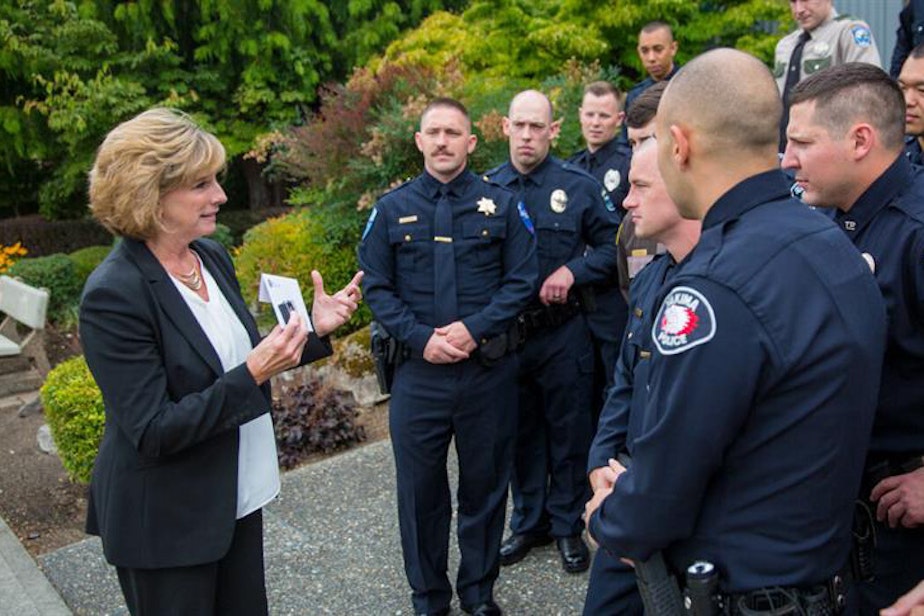
Rahr serves on the board of directors for the National Policing Institute, which is dedicated to advancing policing through innovation and independent scientific research.
She said that, when it comes to hiring and retention, you have to consider how society’s expectations of policing, and police culture, have changed.
“It used to be, you know, the cool profession to go into in the 60s, 70s, 80s,” Rahr said. “All these cop shows came up, and police were portrayed as heroes.”
Now, Rahr said, media portrayals are more nuanced, and often more critical .
“The negative perception that some members of the public have, I think that definitely discourages the people coming into policing that do it because they want to be the hero, and they want people to admire them,” Rahr said.
RELATED: Seattle police face reckoning over 'culture' in 2024 as federal oversight winds down
That means that when departments are looking for people to get into law enforcement in 2024, they have to target a different demographic, she said.
Rahr said demographics are also a factor.
Officers who joined during a massive hiring push during the Clinton Administration are now retiring.
“In the King County Sheriff's Office in particular, we were looking at the numbers going, ‘Oh, baby, we better get ready here [for a wave of retirements]’” Rahr said. Many officers, she said, waited a few more years than planned due to the 2008 recession, but now the silver wave has hit.
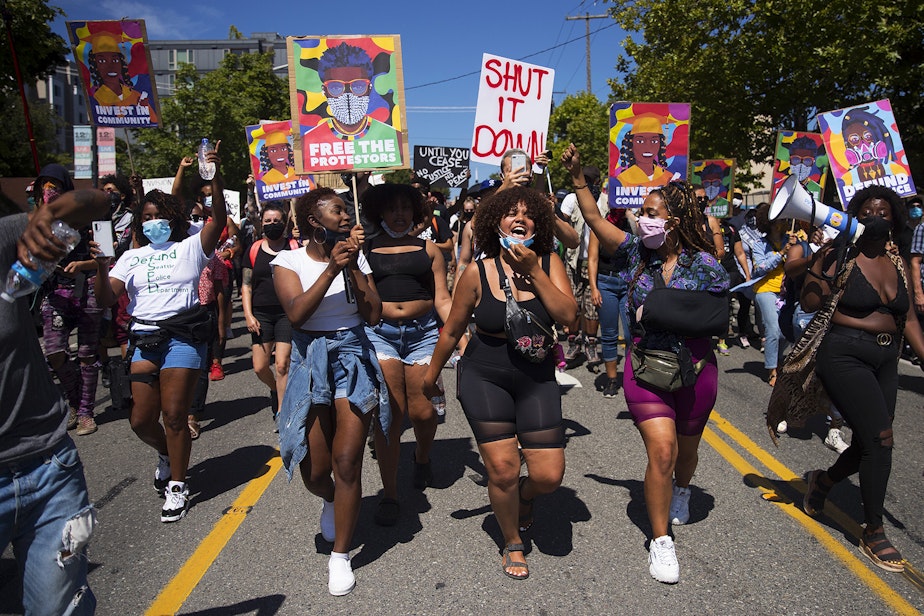
Rahr said public sentiment following the 2020 protests could have had some impact on hiring and retention, “But I believe and this is my personal experience, that that is probably the smallest factor.”
Rahr said positive changes also have come from the protests of 2020, including who is applying to become an officer recruits that want to do good and serve their community.
Rahr argued that the future of police recruitment rests on broader policy decisions by lawmakers – like how and when police response is appropriate.
“We have to stop using the police as a substitute for properly funding social services, mental health, substance abuse, housing, employment, all of those things are the strongest factors in driving crime and disorder,” she said.
“Things are falling apart,” she said, “and we're using the cops to clean up the mess.”
Ultimately, a police department is a workplace, Rahr emphasized. And many local departments that are known as good places to work have had no trouble fully staffing their police force.
“Most recruiting does not happen at recruiting fairs or through an advertisement in the newspaper. It's word of mouth,” Rahr said. “I believe with all of my heart that strong leadership, and positive culture is hands down the most important factor in retaining officers, and when you retain good people, the word gets out, this is a good place to work.”





